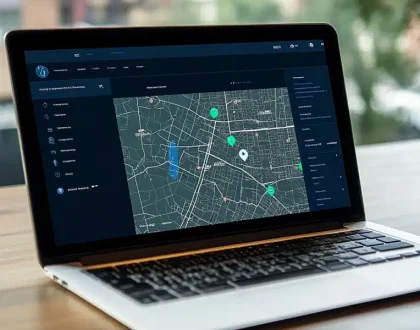
GPS Tracking Software and Fleet Management System: Optimize Your Fleet Operations
Optimize Your Fleet Operations
Fleet operations managing a fleet of cars is challenging since there are several tasks to complete simultaneously. The obligations which range from supervising drivers and arranging maintenance to regulating fuel expenses and guaranteeing safety can easily become too much to handle. But here is where GPS tracking software and a fleet management system come in handy. These products provide you with the information you need for whole fleet optimization through the use of contemporary telematics and tracking.
Businesses can increase productivity, safety and cost management while gaining a competitive edge by implementing this technology. Moreover A dependable system allows you to stop issues before they start rather than merely fixing them after they arise. This method enables you to have a clear view of your complete fleet in the modern world and utilize data to make more intelligent and well informed judgements. Every latest company with a fleet should employ these systems, and this tutorial will explain how they operate.
What is GPS Tracking Software Fleet Operations?
GPS tracking software uses the Global Positioning System (GPS) to track and monitor a vehicle’s exact location in real time and fleet operations. Giving firms visibility over their mobile assets is its main goal. Moreover, the way this system operates is that each car has a GPS tracking device installed, which uses a network of satellites to pinpoint its precise location. After that, the system sends the position data to a central server through a satellite or cellular network.
Additionally this data is available via a mobile application or web based platform which enables real time vehicle tracking from any location. Important characteristics frequently consist of:
Real time Location Tracking: View a live map of your cars’ current whereabouts at all times.
Geo Fencing: Using geofencing you can draw virtual lines around particular areas and get notifications whenever a car approaches or leaves one.
Alerts & Notifications: Also receive real time alerts for reckless driving, illegal use or severe braking allowing for prompt action.
GPS fleet tracking of this type offers the fundamental information required for more sophisticated fleet management.
What is a Fleet Management System Fleet Operations?
A fleet management system uses GPS data and vehicle information to help businesses manage operations from one platform. GPS tracking just displays the positions of vehicles; fleet management systems on the other hand provide you with modern performance information. This telematics system offers detailed data to enhance your entire business, not just tracking.
The following are the main purposes of fleet optimization software:
Scheduling for Vehicle Maintenance: Monitor engine hours and miles to automate maintenance reminders and minimize unplanned failures.
Fuel Monitoring: Fuel management involves tracking driving behavior, idling durations, and fuel consumption to find ways to cut fuel expenses.
Driver Performance Monitoring: You can keep an eye on the driver’s performance such as the driving speed, braking, and vehicle acceleration mode. It will help you boost and improve driver safety and professional practice.
Route Optimization: Create the most efficient routes for your drivers to reduce distance, save tim,e and improve customer service.
In the end a fleet management system provides the tools for complete fleet control and optimisation.
Benefits of Using GPS Tracking Software and Fleet Management System
Integrating a combined GPS tracking and fleet management solution offers tangible benefits that directly impact your bottom line and operational success.
Reduce Operational Costs and Fleet Operations
One of the most important benefits is the possibility of cost reduction. By monitoring driver behavior, you can prevent excessive speeding and idling, resulting in lower fuel use. Research discovered that minimizing idling can save companies hundreds of dollars per vehicle per year. Moreover proactive maintenance scheduling also avoids expensive emergency repairs and increases vehicle lifespan, resulting in long term and cost effective fleet solutions.
Improve Driver Safety and Accountability with Fleet Operations
Under a culture of Safety, Monitoring of driver behaviour handles risky behaviours such as acceleration, braking, and speeding. Drivers can get Customized Instruction. Drivers are aware of their performance and pay more attention, this helps with lower insurance and more safe driving.
Optimize Routes and Increase Efficiency
Allotting time for Route planning and Optimization is an automatic response. The use of Route planning software is more effective than the completion of the rest of the users working together. Fleet performance overall improves. Moreover, customer satisfaction is higher. There is less fuel consumption and less strain on the vehicles in use.
Prevent Vehicle Theft and Unauthorized Use
All vehicles within the fleet are valuable business assets. The use of solid Security Measures is a necessity to protect the assets. If a vehicle is stolen the ability to see its current reflection and to follow its path on a Set route increases the chance of Recovery. The use of Vanishment protection and after-hours alerts helps ensure that vehicles are used for business and that there is no misuse after hours.
Key Features to Look for in GPS Tracking Software & Fleet Management Software
Not all systems are created equal. When selecting a solution, look for these essential features:
- Real Time Tracking & Reporting: Monitoring and reporting in real time: It is essential to be able to track the whereabouts of your fleet in real time. Additionally, the system must offer thorough reporting on historical data.
- Automated Alerts: Proactive management is made possible with customisable alerts for harsh braking, speeding and idle geofence infractions.
- Maintenance Reminders: A solid vehicle monitoring system automates maintenance scheduling based on mileage or engine hours to keep your fleet in peak condition.
- Integration with Mobile Apps: For managers and drivers to access and communicate on the go a user friendly mobile app is required
- Reporting & Analytics Dashboards: A powerful telematics dashboard should depict critical indicators and give actionable fleet analytics allowing you to identify patterns and make informed decisions.
How GPS Tracking Software Improves Fleet Management System
GPS tracking is the engine that powers effective fleet management providing the raw data needed for smarter operational decisions.
Enhanced Vehicle Visibility
Generally, GPS monitoring on vehicles eliminates doubt. The moment you acquire vehicles you know their whereabouts, their condition and whether they are running behind or ahead of schedule. In case of any unexpected scenarios you are able to adjust easily and continue running your operations with this level of control.
Better Route Planning and Scheduling
Providing precise location services enables you to dispatch the nearest driver to a new job and reduces response time. Historical trip data helps in the identification of recurring delays, suboptimal routes and the inefficient use of route optimization tools, thus planners and optimizers are able to improve their subsequent strategic planning.
Data Driven Decision Making
Leaps of intuition are replaced with insights when thinking about the fleet. Instead of stretching your imagination to delimit the reasons for the high price of fuel, you can easily pinpoint the drivers and vehicles that are idling excessively. This data can help you tackle a multitude of issues. ranging from driver training to the improving use of vehicles.
Improved Customer Service
When a consumer calls to inquire about their ETA, you can give a precise answer instead of an estimated one. This transparency increases consumer trust and satisfaction. More satisfied customers due to better scheduling and faster response times.
Choosing the Right GPS Tracking and Fleet Management System
With many GPS tracking system providers on the market, selecting the right one requires careful consideration.
- Scalability: Make sure to select a system that will keep up with the growth of your company. Any decrease in performance is unacceptable as it will lead to a growing number of vehicles.
- Ease of Use: Furthermore, the system should be streamlined for easy access of managers in the office and the drivers in the field. Complicated systems will not be wanted, and there will be a limited ROI.
- Integration with Existing Systems: Look for fleet software solutions that can integrate with other business tools you use such as accounting or dispatch software.
- Cost vs. ROI: Evaluate the pricing structure (per vehicle fees, hardware costs) and weigh it against the potential return on investment from fuel savings, reduced maintenance, and increased productivity.
Common Challenges & How to Overcome Them
Implementing a new system can come with challenges. Being prepared helps ensure a smooth transition.
- Data Accuracy and Reliability: Additionally, problems with GPS tracking, such as signal loss in isolated locations, might arise. Select suppliers who can store data offline and send it back once connectivity is restored using dependable gear and software.
- Employee Opposition: Some drivers could consider monitoring to be a privacy violation. Avoid this by explicitly outlining the advantages and focusing on safety and equity rather than monitoring.
- Concerns about Cost: It can seem like a large initial investment. Put the ROI first, making a compelling argument for how the system’s operational savings will cover its cost.
- Connectivity Issues: Cellular coverage-related telematics issues may affect real time tracking. Dual-mode satellite and cellular communicators are used by certain systems to counteract this.
Future Trends in GPS and Fleet Management
Fleet management technology is always changing. These trends are being included in future advanced systems:
- AI & Predictive Analytics: Rather than relying just on historical reporting, AI fleet solutions are beginning to employ predictive analytics. This includes predicting traffic patterns to enhance route optimisation and evaluating the need for fleet maintenance before a component breaks.
- IoT Integration: Additionally, everything from cargo temperature to tyre pressure may be tracked by sensors, which then send the information to a central management platform.
- Electric Vehicle (EV) Fleet Management: Management platforms are changing as fleets switch to electric vehicles. Locating charging stations, tracking battery levels, and route optimisation depending on vehicle range are examples of specialised features. For EV adoption, this intelligent fleet management will be essential.
Conclusion
Nowadays, having a fleet management system and GPS monitoring software is essential for operating a profitable and competitive business. Through the provision of unmatched visibility and control over your car, these systems enable you to lower expenses, improve driver safety and increase efficiency. Enroute GPS tracking systems provide data driven insights that help everyone in your company from the dispatcher to the C suite and make better decisions. By using this technology you can increase customer happiness, optimize operations and create a fleet that is more robust and lucrative.
Improve the effectiveness and safety of your fleet operations right now.
FAQ's
It depends on your business size, needs, and budget. The best software offers real-time tracking, maintenance scheduling, driver behavior monitoring, and easy integration.
It lowers costs through optimized routes, reduced idling, preventive maintenance alerts, and data that can even help cut insurance premiums.
Yes. Fleet management systems display all vehicles in real time on a single map, allowing full visibility of your assets.
Most providers offer Android and iOS apps, enabling managers and drivers to access schedules, routes, and communication on the go.
Telematics boosts efficiency by improving route planning, monitoring driver behavior, automating compliance tasks, and reducing fuel and maintenance costs.



